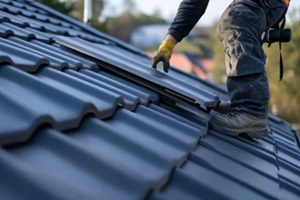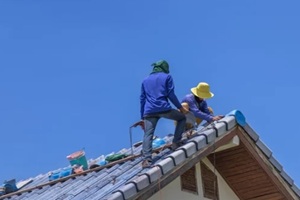
A roof replacement is a major investment, and with this, most homeowners want assurance that the new roof will last for decades. That’s what makes roof warranties important. These agreements protect Northern Virginia and Maryland homeowner from certain unexpected costs, but only if they understand what is covered and, just as importantly, what is not.
Here, we are taking a closer look at the different types of roof replacement warranties, what they typically include, what they don’t, and how to make sure you’re covered for the long term.
Types of Roof Replacement Warranties
There are two types of roof warranties: manufacturer warranties and workmanship warranties. A manufacturer warranty covers the roofing materials. If the shingles have a defect or underlayment that leads to failure, such as premature cracking or curling, the manufacturer may cover the cost to replace the faulty materials.
However, labor is not always included unless you’ve purchased an upgraded version of the warranty. Manufacturer Owens Corning offers a helpful breakdown of roofing material coverage levels, which range from basic material-only warranties to comprehensive systems protection when their entire product line is used.
Workmanship warranties are provided by the roof replacement contractor. These warranties cover installation-related issues, such as improper flashing, poor ventilation, or fasteners that weren’t installed to code. Since even the best materials can fail if installed incorrectly, workmanship protection is an essential part of your total coverage.
What’s Usually Covered With a Warranty
The exact details of your warranty will depend on your roofing system and contractor, but most warranties will include:
- Manufacturing defects in roofing shingles or components
- Roof system accessories such as the underlayment and ridge vents, when installed as a complete system
- Certain types of labor, if extended coverage is purchased
- Installation errors, if a workmanship warranty is provided

Some manufacturers allow you to upgrade to an extended warranty by using certified installers and approved materials. For example, using an entire roofing system from a single brand may qualify you for longer or more inclusive protection. Be sure to clarify what is covered in your warranty coverage with your installer.
What’s Typically Not Covered Under Warranty
To avoid unpleasant surprises, take time to understand what is not covered by your warranty. Most standard warranties do not include:
- Damage from extreme weather: hail, windstorms, or falling debris
- Roof leaks caused by clogged gutters or improper maintenance
- Interior damage to ceilings, walls, or insulation due to leaks
- Foot traffic or installation of satellite dishes or solar panels after the fact
- Modifications made by non-certified contractors
- Neglect or failure to follow manufacturer maintenance guidelines
If, after reading your warranty, you are unclear, applicable exclusions should be confirmed with your installer.
Are Roof Warranties Transferable?
If you’re planning to sell your home in the near future, warranty transferability is worth paying attention to. Some warranties can be passed along to a new homeowner, but not all. In some cases, they must be transferred within a certain timeframe (often within 10 years) or a fee may be required.
The Federal Trade Commission (FTC) recommends getting all warranty terms in writing and asking specific questions about transferability during your purchase. A transferable warranty can be a valuable selling point that reassures buyers the roof is still protected.
Tips for Keeping Your Warranty Valid
To get the full benefit of your roof warranty, you’ll need to follow the rules set by the manufacturer and your contractor. Common requirements include:
- Registering your warranty shortly after installation
- Scheduling periodic inspections to catch and document problems early
- Keeping a record of all roof-related maintenance or repairs
- Avoiding third-party alterations or installations without approval
Neglecting maintenance, using the wrong products, or hiring an uncertified contractor for repairs can all void your warranty, even if the original materials were under warranty. The Better Business Bureau also advises homeowners to thoroughly review warranty terms before signing any contract.
Choose the Right Contractor for Long-Term Benefit
Even the best roofing materials won’t perform well if installed incorrectly. Choosing an experienced, well-reviewed contractor is one of the most important elements of protecting your investment. Working with a certified installer also helps you qualify for the strongest warranties available from manufacturers.
Work With a Locally Trusted Roof Replacement Team

In Northern Virginia and Maryland, the Expert Exteriors team prioritizes speed, accuracy, and clear communication throughout every project. Our owners are involved in the day-to-day operations, so clients benefit from consistent quality and personal oversight.
Unlike larger corporations that may schedule months out, Expert Exteriors can typically begin work within one to two weeks of contract signing. We also emphasize a clean, respectful job site and provide fast service with minimal disruption to your home or schedule.
To schedule your free consultation or learn more about warranty-backed roofing solutions, visit https://exexteriors.com or call (571) 316-2192.
Schedule Estimate
"*" indicates required fields
